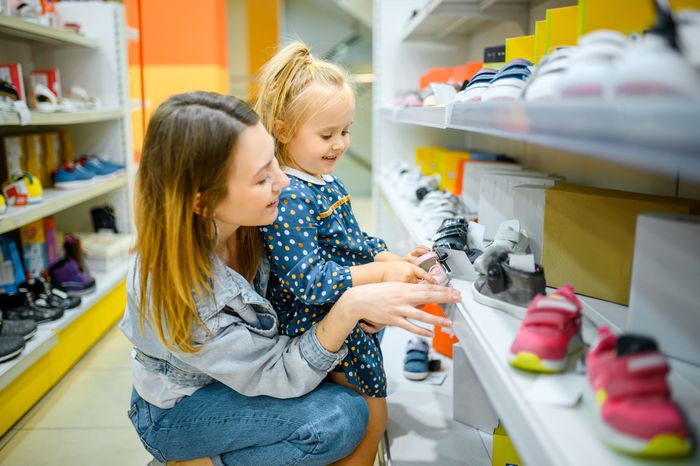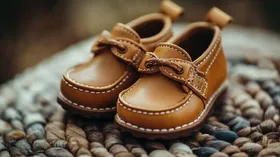What Makes a Shoe Orthotic-Friendly for Kids?
Orthotic-friendly shoes allow the use of custom inserts to address the pain and correct misalignments in kids' feet
Published June 12, 2024.

During childhood, feet are incredibly malleable as bones, muscles, and ligaments are still growing. Orthotic-friendly shoes can help this process by providing extra support and cushioning.
Where structural issues lead to misalignment and pain, orthotic-friendly shoes allow the use of custom inserts necessary to address the pain and correct misalignments for children who may develop flat feet, high arches, or gait abnormalities.
» Have children with flat feet? Here are the best orthopaedic shoes for kids with flat feet
Design and Construction Features
The overall structure and architecture of orthotic-friendly shoes are essential factors in their quality. Here's what to look out for:
- Removable insole: This is non-negotiable for orthotic-friendly shoes. A removable insole provides adequate space for custom orthotics to fit comfortably and function correctly.
- Supportive heel counter: A sturdy heel counter is crucial to stabilize the heel and ankle, ensuring proper alignment and reducing excess movement even when orthotics are involved.
- Wide toe box: Children's toes need space to move. A spacious toe box allows for the natural spreading of the toes and also the use of orthotics.
- Overall fit and sizing: It's highly recommended that you get a professional fitting. While orthotic-friendly shoes consider many factors, a proper fit in terms of length, width, and overall comfort ensures that the design features can work their best.
- Reinforced stitching: Double stitching or denser stitching patterns add extra strength, helping to prevent seams from tearing and extending the life of the shoe. Therefore, parents should look for shoes with reinforced stitching around the toe box and where the upper connects to the sole.
- Robust upper materials: Materials like quality leather or tightly woven, abrasion-resistant mesh are more resistant to scuffing and wear and tear during active play.
- Rubber outsoles: Durable rubber outsoles, especially when reinforced at key wear points like the heel and forefoot provide excellent grip and increase the shoe's lifespan.
- Water-resistant treatment: A water-resistant treatment on the upper materials helps keep feet dry and protects the shoe from the elements. This not only enhances comfort but also prevents materials from degrading quickly due to moisture.
» See our list of the top waterproof shoes for kids
Which Materials Are Best?
A balance of support and breathability is key:
- Leather offers durability and support and conforms to the foot over time.
- Mesh provides excellent breathability and some flexibility, keeping little feet cool and comfortable.
- EVA foam is lightweight and makes for a good shock-absorbing material commonly found in the midsoles of shoes.
Ideally, your orthotic-friendly shoe should have a balance of these materials and include the following constructive features:
Firm, supportive midsole: Certain materials, including various densities of EVA foam, offer a good blend of cushioning and support and are ideal for the midsole. Firmer variations of EVA at critical areas can further help the orthotic function.
Durable outsole: The outsole needs to withstand regular wear and tear while remaining stable, as well as complementing the support provided by the midsole and orthotics. Thus, rubber is commonly used as an outsole material.
Upper materials: The upper part of the shoe should balance support with breathability. A blend of leather and engineered mesh fabrics is best when constructing an orthotic-friendly shoe.
Fit and Comfort Considerations
Kids' feet grow rapidly, so regular professional measurements are vital.
While it may help to leave a little extra space in the shoes for growth, too much space can cause the foot to slide around and reduce stability. Choose orthotic-friendly shoes in your child's current size to ensure the insole shape and length match their foot shape.
» Here are the effects of improperly sized shoes on kids' feet
Be sure to keep the following in mind:
- Appropriate width: Orthotic-friendly brands offer different widths to accommodate various foot shapes and the additional volume of an orthotic. Get your child's feet measured for width as well and select shoes accordingly.
- Heel fit: The heel should fit snugly into the heel counter without slipping or excessive movement. This prevents the orthotic from shifting and ensures optimal support of the rearfoot.
- Comfort: Have your child try on the shoes with the orthotics in place and walk around. Watch for any signs of discomfort, pinching, or rubbing, so those points can be addressed.
- Adjustable closures: Velcro straps or laces allow parents to fine-tune the shoe's fit, ensuring it sits snugly even after adding an orthotic insert. They allow you to adjust the tightness across different areas of the foot, providing a more individualised and secure fit while also loosening them or stretching them out slightly as the foot grows.
How to Clean Your Kids' Shoes
Different materials often require different cleaning procedures. Here's a breakdown of care instructions for the three most common materials:
Leather
Spot clean dirt and stains with a damp cloth and a bit of mild leather cleaner and allow to air dry away from direct heat.
Use a leather conditioner periodically to keep the material supple, prevent cracking, and enhance water resistance. Polish leather shoes to restore shine and protect them further.
Mesh
Remove loose dirt by brushing gently with a soft-bristled brush. For deeper cleaning, use a mixture of mild detergent and warm water—apply with a sponge or soft cloth, rinse well, and allow to air dry completely.
Warning: Avoid machine washing mesh shoes, as it can damage the material or weaken glued seams. Opt for hand-washing where washing is necessary.
EVA Foam
EVA foam (often found in midsoles) is relatively low-maintenance. Spot cleaning with a damp cloth and mild soap should suffice.
Warning: Avoid exposing EVA to extreme heat, as this can cause the material to warp or degrade.
» Still unsure? Here's all you need to know about washing different types of kids' shoes
Common Mistakes When Choosing Kids' Shoes
Mistake 1: Assuming All “Supportive” Shoes Are Orthotic-Friendly
Not all shoes marketed as supportive are truly designed for orthotics. Look for features like removable insoles, wide toe boxes, and sturdy heel counters which are essential for accommodating orthotic inserts.
Mistake 2: Prioritizing Fashion Over Fit
While stylish shoes are appealing, proper fit should be the top priority. Orthotic-friendly shoes don't have to be unfashionable, but you should always prioritize form and function over style.
Mistake 3: Not Measuring the Child’s Feet Professionally
Kids' feet grow rapidly and outdated measurements lead to ill-fitting shoes. Getting a recent professional foot measurement (length, width, and arch height) is crucial in selecting the appropriate size and type of shoe.
Mistake 4: Thinking Orthotics Are Enough
While orthotics can address specific biomechanical issues, orthotic-friendly footwear is a key part of the overall treatment plan. Choosing the wrong shoes can undermine the effectiveness of the orthotic.
» Need more help? Here's our online shoe shopping guide for kids
Find Orthotic-Friendly Kids' Shoes With First Walkers
At First Walkers, we understand that every child's feet are unique, and some may require orthotics to ensure proper development and comfort. Browse our selection of orthopaedic shoes that are orthotic-friendly and designed to accommodate orthotics without sacrificing style or fit. Our shoes feature spacious toe boxes, removable insoles, and secure closures to provide the support your child needs to walk, run, and jump with confidence.






